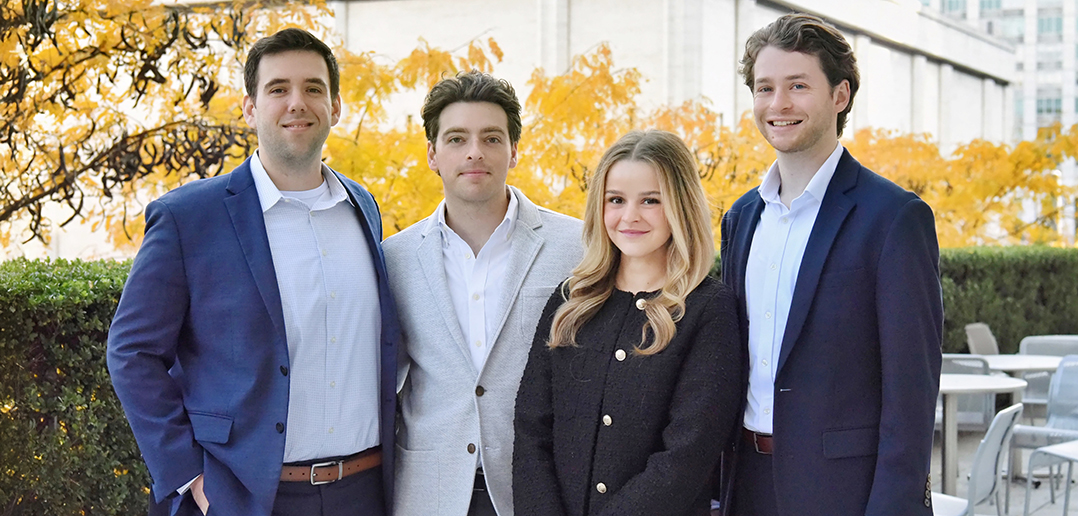The 2022 Electoral Count Reform Act (ECRA) was designed to address ambiguities in a 19th century law governing presidential elections and ensure that electoral votes tallied by Congress accurately reflect each state’s vote for president. Students in Fordham Law’s Rule of Law Clinic are taking a deep dive into the intricacies of New York state election law to understand how New York will uphold the new federal guidelines.
They are building off a report written by Seamus Crowley ’24, Molly Johnston ’25, Alexander Paget ’25, and William Russell ’25—students in the Rule of Law Clinic during the spring semester. The report, “State Laws for Administering Presidential Elections: Recommendations and Considerations for Reform,” was released in July.
In a Q&A, Robert Debenedetti ’25, John Greenberg ’24, Arianna Bufalino ’25, and William Bernstein ’25—all students in this semester’s Rule of Law Clinic—answered questions about the reforms and commented on the chaos that could arise if the electoral college is deadlocked.
The federal Electoral Count Reform Act changes some rules for states to follow when certifying their presidential election results. How is New York planning to meet the deadlines the ECRA creates? Do you see any potential issues that could cause chaos?
Robert Debenedetti: Under the ECRA, states must certify their presidential election results by six days before the Electoral College meeting, which this year is December 11, as the Electoral College convenes on December 17. This requires all states to complete certification within 36 days after Election Day. In New York, county boards of elections must certify and submit their results to the state board within 25 days after the election. The state board then completes the final certification. Any potential audits or litigation are handled by state or federal courts. The ECRA creates jurisdiction for a panel of three federal judges to decide cases brought by presidential candidates and provides for direct appeal to the U.S. Supreme Court. If these procedures are followed, New York’s election certification should proceed smoothly.
The ECRA has emergency provisions for extending the time for voting in presidential elections past Nov. 5. What kinds of events qualify? How will this work in New York?
John Greenberg: The ECRA includes a provision that allows states to extend time for voting in the presidential election beyond Election Day on November 5th due to “force majeure events that are extraordinary and catastrophic.” Each state determines how to implement this provision. New York has not passed a law specifically implementing the ECRA’s force majeure provision. But New York could use its election emergency law that provides, if “a fire, earthquake, tornado, explosion, power failure, act of sabotage, enemy attack, or other disaster” results in less than 25% of registered voters in a city, town, or village participating in the election, the county board of elections (or the state board for elections covering multiple counties) can declare an additional day for voting. This additional day must be scheduled within 20 days of the original election date, and only those who did not vote on the original day may participate. Voting must be conducted in person, using the same sealed machines from the original election day.
To prevent the “fake electors” problem that arose in 2020, the ECRA requires that states must include a “security feature” on each state’s Certificate of Ascertainment, which declares the winner. The security feature is meant to prevent any counterfeiting. What is New York doing about this and is it enough to prevent fraud?
Arianna Bufalino: In August, Section 12-102 of the New York Election Law was amended to implement the security feature requirement. New York’s chosen security feature is an “embossment of the seal of the state.” However, expanding on the recommendations in the Rule of Law Clinic’s 2024 report, we will be advocating that New York further reform this law to implement a confidential security feature. By publicizing the chosen security feature, bad actors may still attempt to create counterfeit certificates, thereby defeating its purpose. Many states have passed laws requiring the security feature be kept confidential, designating an official to determine it. We believe this confidentiality requirement could provide additional protection from the “fake elector” problem that arose in 2020.
In addition to examining New York State electoral reforms, the Rule of Law Clinic is also exploring federal issues such as the contingent election process that would take place in the event that no candidate won a majority of electoral votes, such as with a tie. What kinds of problems do you foresee if Trump and Harris are deadlocked?
William Bernstein: A contingent election could cause Americans to lose trust in the electoral process and question the legitimacy of the new president. The House of Representatives would elect the president with each state getting one vote, and a majority of all states required to win. This means that the largest and smallest states would have the same representation in a contingent election, while Washington, D.C., would be unrepresented. Additionally, there are procedures that the new Congress would have to pass before the contingent election, which could allow the majority party to make rules for their benefit. If the majority party wants to block the other party’s candidate from winning, they might implement a higher vote threshold in state delegations to prevent many states from casting their votes. Congress would also have to decide whether ballots should be public or private. Citizens may favor public ballots, which would provide transparency and accountability in the voting process. However, public ballots could increase pressure and threats against lawmakers.

